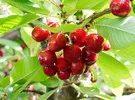 Imported cherries will begin this week with fruit from Chile and from Argentina.
Imported cherries will begin this week with fruit from Chile and from Argentina.
“Every year Chile is expanding acreage and their volume that’s available. They’ve also had a good crop set this year compared to last year so their total volumes will be up a good 15 percent plus,” says Roland Berndt of Sierra Produce based in Orange, CA. At the same time, Argentina, which has considerably less cherry production compared to Chile, underwent frost earlier this year, but will also begin shipping next week.
Berndt notes that the first air shipments start this week and the first boat shipments will arrive by early December. Cherries from these regions should last until February.
However, the U.S. market remains a relatively small one for southern hemisphere cherry growers. “China normally takes more than 90 percent of Chile’s crop. Last year China took 92 percent or 47 million boxes last season. At the same time, the U.S. took 817,000 boxes,” says Berndt. “Our market and every other market in the world are very small compared to China.”
Air transportation costs
That said, demand has been relatively stable for southern hemisphere cherries. However, extenuating factors may play into that this season. “Cherries by air are quite expensive because there’s so much cost in air freight,” he says. Notably, this will also be the first time the cherry deal has to contend with COVID-19 factoring into it given last year it was finished up by the time COVID-19 hit North America. “COVID-19 is the million-dollar question as to what the take is going to be,” says Berndt. “Airlines have grounded a lot of their flights so most likely we’ll see more expensive air cargo going into the holidays because of the lack of flights.”
So, while Berndt believes pricing could be similar to last year, higher transportation expenses could make their way into pricing and demand for potentially higher-priced fruit will also play a role. “The biggest X factor is: how much demand will there be at retail? It’s an expensive item compared to other things and I don’t see there being an overwhelming demand for cherries at a high price point,” says Berndt.
For more information:
Roland Berndt
Sierra Produce
Tel: +1 (657) 229-6100
[email protected]
www.sierraproduce.com
